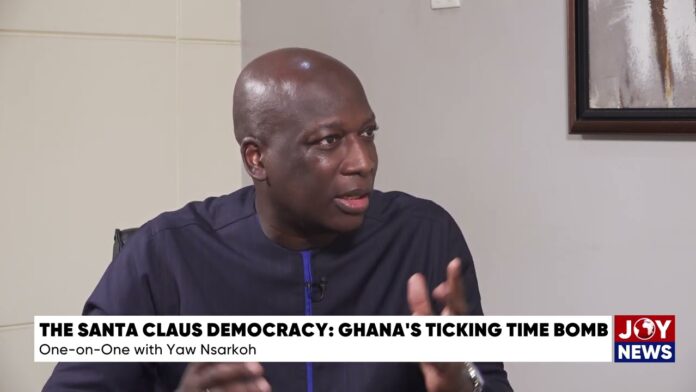Former Executive Vice President of Unilever Ghana and Nigeria, Yaw Nsarkoh, says Ghana may have embraced the appearance of democracy, but the substance never followed.
He made the remark during a candid conversation on JoyNews’ PM Express, following his thought-provoking lecture titled “Iniquities of Iniquity in Our Santa Claus Democracy.”
In his view, Ghana does not practice a homegrown democratic system but rather an imported template lacking the critical foundations that allow such systems to thrive elsewhere.
“We imported democracy without the foundations that made it work in the West,” Nsarkoh stated, drawing a clear distinction between form and substance.
“You don’t get a working democracy just because you put up ballot boxes and sing an anthem. If you haven’t built the underlying institutions, you’re playing a dangerous game.”
His argument is rooted in both historical context and political economy.
Unlike nations where modern democratic systems evolved after sustained industrialisation and capital accumulation, Ghana and much of Africa, he explained, attempted to graft democracy onto states still grappling with the hangover of colonialism and severe economic fragility.
“When modern European democracy took root, they were distributing wealth that had already been created. We didn’t have that. We started from under $3,000 per capita GDP. That’s a fundamentally different conversation,” he said.
Nsarkoh emphasised that democracy without a strong economic and institutional base degenerates into a transactional contest—what he termed “a public auction for the highest bidder.”
In such systems, he noted, the electorate is reduced to passive participants, voting every four years and then retreating into silence while elite groups trade power for personal gain.
He was especially critical of the idea that independence automatically conferred sovereignty.
“Kabral Blay-Amihere said it and got into a lot of trouble: what kind of independence do you really have if you don’t control your productive forces?” Nsarkoh asked.
“Having a dark-skinned president and a new anthem doesn’t mean you’ve achieved independence. You’re still navigating a distorted reality.”
Citing the work of political economist Claude Ake, Nsarkoh argued that African states did not emerge organically but were shaped by colonial disruptions, leaving behind weak and artificial structures.
“The post-colonial elite took over the facilities of the state and became the new colonialists. They looked after themselves,” he said. “That’s the deformity we’ve refused to confront.”
He lamented the collapse of local governance, describing it as symptomatic of a broader democratic decay.
“Look at the space we’re in—local government has essentially collapsed. Where is the citizen engagement? Where is the accountability?” Nsarkoh asked.
“We’ve built a system where people come to power not to serve, but to recover their campaign investments.”
At the heart of his message is a warning: Ghana’s democracy, if not radically rethought, risks becoming a hollow ritual.
“This Santa Claus democracy we’re practising is not sustainable,” he said.
“It feeds expectations but doesn’t deliver outcomes. It’s dangerous because it breeds disillusionment—and disillusionment is the seedbed of instability.”
ALSO READ:



